User:Fuzheado/Wikipedia100 sample page
Endive Edit Wars
[edit]Keywords
[edit]food, NPOV, edit war, French, Belgian, British, Lebanese, Middle East, endive, chicory, potato chip, hummus, radicchio, escarole
Overview
[edit]There has been a long-running debate about whether the vegetable scientifically known as Cichorium endivia or Cichorium intybus should be called "endive" as the French do, or "chicon" as the French-speaking Belgians do (Belgium is the world's largest exporter of endives; actually is the Flemish part of Belgium that does the exporting, there the vegetable is called "Witloof")
Detail
[edit]Where do you live? Chicory or Endive?
[edit]
Chicory is a plant from the dandelion family that usually has bright blue flowers. Many types of chicory are used for salad leaves, and the roots can be used as a coffee substitute.
Chicory usually grows to between 10 to 40 inches, and the flowers that bloom are usually blue and 2 to 4 cm in width. Flowers bloom from July to October.
The plant can be grown in multiple areas of the United States, but different varieties of chicory and endive can be found in the northeast region of the US, as well as Arizona.
Chicory is also grown as a forage crop for different types of livestock.
“Chicory“ is the name commonly used in the United States to identify curly endive. Both are closely related plants but not the same.
Wild chicory is used in many cuisines, specifically in Italy, Catalonia, Turkey, Greece, and Albania.
Other Varieties
[edit]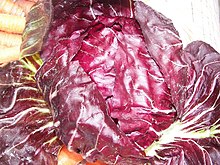
Radicchio
[edit]This white-veined, red leafed vegetable is a leaf chicory that is a sometimes known as Italian chicory.

Escarole
[edit]Escarole is a form of endive that has broad, pale green leaves. It is less bitter than other types of endive and is eaten like other greens.
Articles
[edit]See Also
[edit]Other famous food disputes
[edit]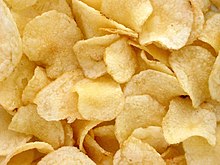
Potato chip
[edit]Potato chips are what Americans call thin slices of potato that have been fried or baked, while Britians use the term ‘Crisp’ for the same food.
Article
[edit]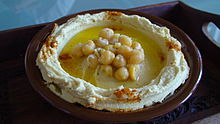
Hummus
[edit]Both the Lebanese and other Middle Eastern countries have argued over the control. Lebanon wants it under thier dowman, while others say it should just be treated as a Middle Eastern dish.
Article
[edit]
What's the word, Buffalo?
[edit]Keywords
[edit]buffalo, sentence diagram, semantic satiation, disambiguation, parse trees
Overview
[edit]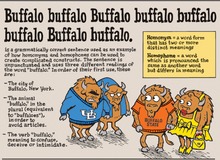
“Buffalo buffalo Buffalo buffalo buffalo buffalo Buffalo buffalo” is an American English sentence that is grammatically correct. It is used as an example of how homonyms and homophones are used to create complicated linguistic constructs.
Since 1967, the sentece has been disussed in various forms in literature and first appeared in Dmitri Borgmann’s Beyond Language: Advenrtures in Word and Thought.
Detail
[edit]Sentence Diagram
[edit]
A sentence diagram, also known as a parse tree is a pictoral representation of how a sentence is structured grammatically. The phrase “sentence diagram” is used more where the sentences are diagrammed.
The purpose of the parse tree is to be a model of sentence structures and relations between words.
Main articles
[edit]Buffalo buffalo Buffalo buffalo buffalo buffalo Buffalo buffalo, Sentence diagram
See Also
[edit]Semantic Satiation
[edit]Semantic satiation, or semantic saturation is a psychological phenomenon where when a person repeats a word or phrase over and over, the word or phrase temporarily loses the meaning for the listener. The word or phrase then perceives the speech as meaningless sounds.
Article
[edit]Buffalo Disambiguation
[edit]The term buffalo is a term that is widely used across the globe to describe animals, places, schools, music, sports, coins, computing technology, transport, people, and other uses. Some notable Wikipedia pages related to the term buffalo are Black Bufflalo, a Japanese wrestler, the USS Buffalo, a US Navy ship, and Buffalo Airways, an airline.
Article
[edit]
Buttered Cat Paradox
[edit]Keywords
[edit]Cat, Buttered Toast, Reflex, Orientation, Paradox
Overview
[edit]The buttered cat paradox is a common joke based on the combination of two philisophical sayings
1. Cats always land on their feet.
2. Buttered toast always lands buttered side down when dropped.
The paradox comes about when one examines the scenario of if a person attaches a piece of buttered toast, with the buttered side up, on the back of a cat, then dropped the cat from a high place.

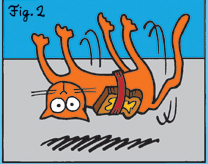

Detail
[edit]In Reality
[edit]Cats have the ability to turn themselves right side up mid-fall if they started falling upside down, which is known as the car righting reflex. IT allows the cat to land on their feet if dropped from at least 1 foot.
Toast, as an inanimate object, lacks both the ability to right itself mid-fall, as well as the desire to do so. Toast usually will land butter-side down due to how it is typically dripped from a table.
When toast falls from the table, it rotates. Considering the typical speed of rotation for a slice of toast as it falls from the table as well as the typical height of a table, a slice of toast that began to fall butter-side-up when dropped at the table will land butter-side-down on the floor in 81 percent of all cases.
Cats can typically weigh between 6.2 pounds and 13.4 pounds. A slice of bread, the typical weight being 0.9 oz, will have no significant effect on the movement of the cat considering the cat is much larger.
Main articles
[edit]See Also
[edit]Cat righting reflex
[edit]The cat righting reflex is a cat’s innate ability to orient itself as it falls in order to land on its feet.
The righting reflex first appears when the cat reaches 3–4 weeks of age, and is fully perfected at 6–7 weeks. Cats are able to do this because they have no functional clavicle (collarbone) and an unusually flexible backbone.
Article
[edit]List of Paradoxes
[edit]Wikipedia has compiled an article of different paradoxes. They are grouped thematically, with themes such as logic, mathematics, biology, time travel, and others.
Some of the paradoxes are based on fallacious reasoning, or incomplete or faulty analysis.
